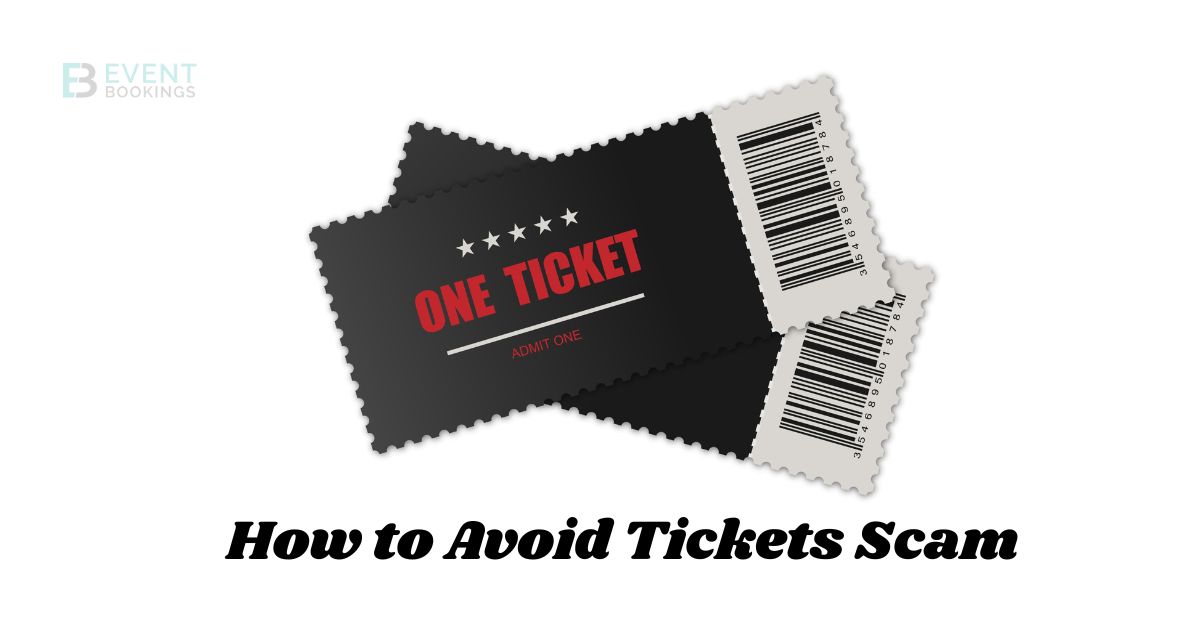Preventing ticket fraud is essential if you want to safeguard both your company’s reputation and your event’s attendance. Additionally, knowing how to recognise a ticket fraudster might help eventgoers avoid losing a lot of money. As one of the biggest online ticketing companies, EventBookings takes cybersecurity and ticket verification extremely seriously. Here, we have come up with this article to shield event planners and attendees against ticket fraudsters. Let’s explore together how to not get scammed buying tickets and how to verify tickets are real.
What are ticket scams?
Unfortunately, ticket frauds are very common in today’s environment. The Better Business Bureau claims that thousands of unsuspecting people are scammed by these frauds every year. Ticket scams are when dishonest people or groups offer fake or invalid tickets to unwary customers.
These frauds are particularly common for events like plays, concerts, and sporting events since they target tickets that are in great demand or sold out. Fraudsters take advantage of people’s desire to attend an event by offering them the opportunity to ultimately go, similar to when a play is sold out. Owing to their frequency, you need to take extra precautions to prevent this fraud, and EventBookings is a reliable ticketing platform to have on your side.
Common ticket scams
Due to the frequent repetition of ticket frauds, specific scam types and patterns appear more frequently. Below is a list of the most popular ones.
Phishing scams
Phishing scams are one of the most common ways scammers trick people into handing over personal information or money. This scam usually starts with an email or text message that appears to be from a legit source—perhaps a popular ticket vendor. The message often contains a link asking you to confirm your ticket purchase or enter your payment details. Once you click the link, you’re taken to a fake website that looks legit but is designed to steal your information.
Bogus websites
Imagine you’re eager to snag tickets for a sold-out concert, and a quick search brings up a site promising available seats at great prices. You think you’ve struck gold, but the truth is that many of these websites are nothing more than elaborate scams designed to collect your credit card information or leave you with counterfeit tickets.
Social media scams
Social media platforms like Facebook and Instagram have become hotbeds for ticket scams. Scammers often post fake listings for high-demand events, offering “exclusive” or discounted tickets. The scammer disappears once the buyer sends the payment, and the ticket never arrives.
In-person scams
While online scams are rampant, traditional in-person ticket scams still exist. In this scam, an individual sells counterfeit tickets outside an event or a public place. These fake tickets can look strikingly real, especially when scammers use sophisticated printing technology.
Fake Email Offers
Everyone loves a good deal, and scammers know this. You might receive an email with an offer for tickets at unbeatable prices. These emails often look legitimate, mimicking the branding of well-known ticketing websites. However, once you attempt to purchase the tickets, your money is gone, and so are your hopes of attending the event.
Scalper Scams
Scalpers have been around for decades, but now they’ve moved online. Scalpers buy large quantities of tickets for popular events and resell them at inflated prices. While some scalpers are legitimate, many operate fraudulently, selling fake or duplicate tickets that won’t get you through the door.
Last-Minute Scams
When an event is about to sell out, panic often sets in, leading to last-minute purchases from dubious sources. Scammers capitalise on this by creating urgency and selling fake tickets at inflated prices.
Fake QR Codes
With digital tickets becoming more popular, QR code scams are on the rise. Scammers sell fake digital tickets that appear to have valid QR codes. However, when you arrive at the event and the code is scanned, you’re turned away because the ticket is fraudulent.
Ticket Lottery Scams
Scammers sometimes set up fake ticket lotteries or giveaways, especially for highly anticipated events. You’re told that you’ve “won” tickets, but you must pay a fee or provide personal information to claim them. Once you send the money, the scammers vanish.
Suspicious Payment Methods
Another common red flag in ticket scams is the method of payment. Scammers often insist on receiving payment through non-secure methods such as wire transfers, prepaid gift cards, or peer-to-peer payment apps. These methods offer little to no buyer protection.
Tips for Avoiding Ticket Scams
Let’s know some practical tips to help you avoid ticket scams. Whether you’re buying tickets online or in person, these strategies can save you from a lot of headaches.
Purchase from official sources

When it comes to buying tickets, your safest bet is always purchasing from official sources. This means going directly to the event organiser’s website or trustworthy ticket sites. These platforms often have security measures in place to prevent scams and ensure you’re getting a legitimate ticket.
Verify the seller

If you’re purchasing from a third-party seller or a resale platform, it’s crucial to verify the seller. You can do this by checking their reputation on social media, looking for reviews, or using platforms that vet their sellers. Some websites like EventBookings offer buyer protection, but it’s still important to double-check the seller’s legitimacy.
Beware of deals that seem too good to be true
You’ve probably heard the saying, “If it’s too good to be true, it probably is.” This is especially true when it comes to ticket sales. Scammers often lure buyers with significantly discounted prices that seem irresistible. A common tactic is offering tickets at half the price or less. While it’s tempting to jump on what seems like a bargain, take a moment to think.
Use secure payment methods
Another essential tip to avoid ticket scams is to use secure payment methods. Always opt for payment options that offer protection. These platforms offer buyer protection programs, allowing you to dispute fraudulent transactions. Avoid paying via wire transfers, money orders, or any methods that don’t offer security. Scammers often push for these types of payments because they are hard to trace and harder to recover.
Beware of unsolicited offers
Receiving an unsolicited offer to buy tickets is a red flag. Scammers sometimes use email, social media, or even text messages to promote fake ticket sales. These messages often include links to fraudulent websites or ask for personal information. It’s always safer to initiate the purchase yourself rather than responding to random offers.
Check for reviews and feedback
Before committing to a purchase, take a moment to check the reviews and feedback. If you’re buying through a resale platform or a lesser-known website, look for reviews online to ensure the seller is trustworthy. Scammers often operate under new or false identities, so a lack of reviews or a brand-new account can be a warning sign.
Be cautious of last-minute purchases
While it’s possible to find last-minute deals on tickets, it’s also one of the easiest ways to fall victim to a scam. Desperation can lead to poor judgment, and scammers know this. If you find yourself hunting for tickets hours before the event, take extra care. Scammers often target buyers in a rush by offering “instant” tickets through unverified platforms or sellers.
Look for Ticket Guarantees
When buying from a third-party platform, check if they offer a ticket guarantee. Many legitimate sites offer some form of guarantee that ensures you’ll either get a refund or replacement tickets if something goes wrong. This can give you extra security when purchasing through resale platforms. Just be sure to read the fine print. Sometimes, these guarantees only apply under specific conditions, so make sure you know what’s covered.
Double-check the Event Details
Scammers sometimes sell fake tickets for events that don’t even exist or for dates that have already passed. Before purchasing, always double-check the event’s official website for details. Make sure the date, time, and location match up with the ticket you’re purchasing. This step is especially important if you’re buying tickets for an event far in advance. An official website or verified platform will provide accurate information that can help you avoid buying fraudulent tickets.
Know Your Refund Options
In the unfortunate event that you do fall victim to a scam, it’s helpful to know your refund options. Some payment platforms and credit card companies offer fraud protection, allowing you to file a dispute and potentially get your money back. If you purchased through a third-party site, check their refund policies. In some cases, you might be eligible for a refund if the tickets turn out to be fraudulent.
What to Do if You’ve Been Scammed
Scams are everywhere, and falling for one can be a distressing experience. Whether it’s an online phishing scheme, a fraudulent phone call, or a fake website, scams can lead to financial loss, identity theft, and a general sense of vulnerability. But what do you do if you’ve been scammed? Act quickly to minimise the damage and protect yourself from future fraud is important.
Report the scam
Your first step should always be to report the scam. Many people feel embarrassed when scammed, but you’re not alone, and it’s important to act. Reporting scams helps authorities track down fraudsters and prevent future scams. You can report the scam to local law enforcement, consumer protection agencies, or even the website where the scam took place.
File a complaint
Next, filing a formal complaint with the relevant authorities is vital. Depending on the type of scam, this could be your local police or your national cybercrime agency. Filing a complaint creates a record of your incident and could help lead to the scammer’s capture or even compensation, if possible.
Monitor your accounts
Your financial information could be at risk once you’ve fallen victim to a scam. Monitoring your accounts for unusual activity is crucial. Check your bank accounts, credit cards, and any online wallets regularly. Look out for unauthorised transactions, withdrawals, or changes to your account details. By staying vigilant, you can catch potential fraud early and minimise losses.
Update Your Passwords
If the scam involves your personal or financial accounts, updating your passwords immediately is essential. Use strong, unique passwords for each account and consider enabling two-factor authentication (2FA) for an extra layer of protection. This is like locking the front door to your digital life, making it much harder for scammers to re-enter.
Alert Your Bank or Credit Card Company
If the scam has affected your finances, immediately alert your bank or credit card company. Many banks offer fraud protection services, and you may be able to reverse any unauthorised charges or freeze your accounts to prevent further damage. Quick communication with your financial institution can make a big difference in recovering lost funds.
Place a Fraud Alert or Credit Freeze
In cases of identity scammers, you can place a fraud alert or a credit freeze on your credit report. A fraud alert notifies lenders to verify your identity before issuing credit in your name, while a credit freeze locks your credit report altogether, preventing anyone from accessing it. These tools safeguard your credit from scammers who might use your personal information.
Protecting Yourself from Future Scams
Protecting yourself from future scams involves a combination of knowledge and vigilance. Regularly review your privacy settings on social media, avoid sharing sensitive information online, and only engage with trusted websites. Prevention is the best defence when it comes to avoiding scams.
Educating Yourself on New Scams
Scammers are constantly evolving, and new tactics are always emerging. Educating yourself on the latest scams can prevent you from falling victim again. Stay informed through reliable news sources, government websites, and security blogs. The more you know, the better you can protect yourself.
Setting Up Alerts
One of the easiest ways to stay safe is by setting up alerts. Many banks and financial institutions allow you to set up notifications for every transaction on your accounts. This way, you can quickly spot any unauthorised activity and act before the damage is done.
How to Spot a Ticket Scammer
Scammers often use specific tactics to trick people. Learn how to spot red flags such as:
- Urgency or pressure to act immediately
- Requests for personal or financial information
- Offers that sound too good to be true
- Emails or messages from unfamiliar sources
By recognising these warning signs, you can avoid falling for common tricks.
Last words
A basic guideline to keep in mind is this: if something looks too good to be true, it most likely is! Deals on tickets or exclusive access to events that are sold out in advance are common components of ticket scams. If something raises any questions in your mind, it’s better to stay away from the danger.
These professional tips will protect your money and the guests at your event. Use feature-rich event management software with integrated payment processing and strong security, such as EventBookings, to enhance every facet of your event management company.




